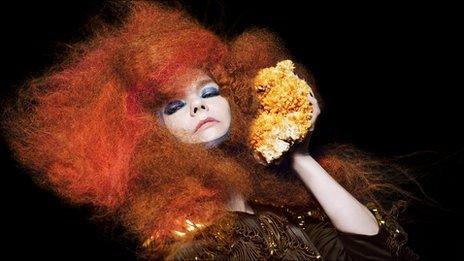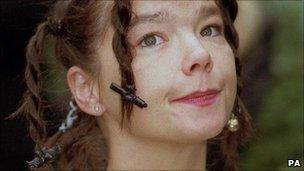Bjork on Biophilia and her debt to UK dance music
- Published

Biophilia will be Bjork's seventh studio album
Biophilia, Bjork's fusion of nature and machines, marks the singer's latest foray into electronic music.
The ambitious project, from Iceland's most famous export, includes a forthcoming album with 10 songs - inspired by the natural world - with corresponding iPad and iPhone applications.
It also features, among other things, educational workshops and a series of live concert residencies in major world cities, which began at the Manchester International Festival at the end of last month.
Fittingly, it was in that rainy city - 20 years earlier - that a young Bjork fell in love with the dance and electronic music that has become so central to her success.
She was there to record a guest vocal for seminal Manchester band 808 State, who were at the forefront of the city's house music explosion in the late '80s and early '90s.
Their collaborations Ooops and Qmart appeared on the band's 1991 album ex:el.
"I remember going to Manchester, and 808 State taking me around, and me just seeing things that I'd never seen - that I'd hoped existed," says the singer, who enjoyed early success with indie band The Sugarcubes.
"So I would be up until early morning... sometimes from just the enthusiasm for the music."
The four-to-the floor rhythms were a big influence on her 1993 solo album Debut, a number three UK hit which spawned singles including Big Time Sensuality, loved by underground and radio DJs alike.
"You would go to a cellar at like 5 or 6 in the morning, some DJ would go on and he would just mix together two wrong songs that were not supposed to be," says the singer, recalling some of her favourite moments in the city.
"And he would have this synthesizer and play on top of it, and you just really felt that no one had done that before."
Bjork sees those times as "my roots" and "definitely one of the things that brought me up, and formed me".
While all her albums have followed Debut into the UK top 10, she's under no illusions that the Biophilia album - which will be released on 27 September - together with its myriad of multi-media spin-offs, is an easy sell.
"Unfortunately, when people are writing about the project, it comes across as being extremely complicated," she says.
"But actually, the intention is to simplify things through touch-screen."
The abum was inspired by touchscreen devices which preceded the iPad, enabling musicians to play sounds by pressing the screen.
"Because I don't play the piano or guitar, and usually I've always written my music when I am just walking outside, I've finally found something that's appealing to me as an accompaniment," she says.
"I can just scrabble with my fingers - it's a breakthrough for me."
Algorithms from nature can be fed into software to create a musical pattern which is then manipulated through the touch-screen, she says.
"They can take the algorithm of gravity or a pendulum - which is pretty complex - and then put it onto a touch-screen, and you can play with it with one finger."
Each of the album tracks - which include Thunderbolt, Virus and Moon - have "a different programme based on that natural element.
"You've got 10 songs with 10 natural elements; their structure is that natural element."
Beautiful ballad
Yet, despite the seemingly complex nature of the songs', the two tracks released as singles so far are eminently listenable.

Bjork's biggest UK hit was It's Oh So Quiet, which reached number four in 1996
Crystalline - "underneath our feet, crystals grow like plants" - begins with naturalistic chiming bells before developing into a full-on drum and bass rock-out.
Cosmogony is a beautiful ballad, complete with full brass backing, which compels "heaven, heaven's bodies" to "whirl around me".
While one reviewer described the Manchester world premiere of the songs as "massively self-indulgent", many more were gushing in their praise of "moments of simple, transcendent beauty".
But with more concert residencies to be announced, other cities may struggle to match Bjork's Manchester experience.
"It was excellent to be there, especially for a whole month, being with all my old mates. We had the wrap-up party with Graham Massey from 808 State DJing and old friends came along - it was amazing."
- Published1 July 2011